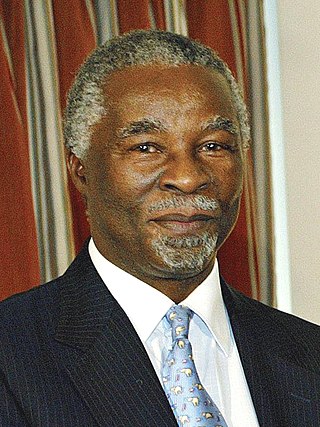| |||||
| Decades: | |||||
|---|---|---|---|---|---|
| See also: | |||||
The following lists events that happened during 1997 in South Africa.
| |||||
| Decades: | |||||
|---|---|---|---|---|---|
| See also: | |||||
The following lists events that happened during 1997 in South Africa.
The Cabinet, together with the President and the Deputy President, forms part of the Executive.

Thabo Mvuyelwa Mbeki is a South African politician who served as the 2nd democratic president of South Africa from 14 June 1999 to 24 September 2008, when he resigned at the request of his party, the African National Congress (ANC). Before that, he was deputy president under Nelson Mandela from 1994 to 1999.

The president of South Africa is the head of state and head of government of the Republic of South Africa. The president directs the executive branch of the government and is the commander-in-chief of the South African National Defence Force. Between 1961 and 1994, the office of head of state was the state presidency.

Uitenhage, officially renamed Kariega, is a South African town in the Eastern Cape Province. It is well known for the Volkswagen factory located there, which is the biggest car factory on the African continent. Along with the city of Port Elizabeth and the small town of Despatch, it forms the Nelson Mandela Bay Metropolitan Municipality.
The following lists events that happened during 1999 in South Africa.
The following lists events that happened during 1995 in South Africa.
1994 in South Africa saw the transition from South Africa's National Party government who had ruled the country since 1948 and had advocated the apartheid system for most of its history, to the African National Congress (ANC) who had been outlawed in South Africa since the 1950s for its opposition to apartheid. The ANC won a majority in the first multiracial election held under universal suffrage. Previously, only white people were allowed to vote. There were some incidents of violence in the Bantustans leading up to the elections as some leaders of the Bantusans opposed participation in the elections, while other citizens wanted to vote and become part of South Africa. There were also bombings aimed at both the African National Congress and the National Party and politically-motivated murders of leaders of the opposing ANC and Inkatha Freedom Party (IFP).

The following lists events that happened during 2002 in South Africa.
The following lists events that happened during 2003 in South Africa.
The following lists events that happened during 2000 in South Africa.
The following lists events that happened during 2001 in South Africa.
The following lists events that happened during 1996 in South Africa.
The following lists events that happened during 2005 in South Africa.
The following events happened in South Africa in the year 1998.
The following lists events that happened during 2006 in South Africa.

South Africa since 1994 transitioned from the system of apartheid to one of majority rule. The election of 1994 resulted in a change in government with the African National Congress (ANC) coming to power. The ANC retained power after subsequent elections in 1999, 2004, 2009, 2014, and 2019. Children born during this period are known as the born-free generation, and those aged eighteen or older, were able to vote for the first time in 2014.
The following lists events that happened during 2008 in South Africa.
The State of the Nation Address of the President of South Africa is an annual event in the Republic of South Africa, in which the President of South Africa reports on the status of the nation, normally to the resumption of a joint sitting of Parliament.

The following outline is provided as an overview of and topical guide to South Africa:

Netherlands–South Africa refers to the current and historical relations between the Netherlands and South Africa. Both nations share historic ties and have a long-standing special relationship, partly due to the Dutch colony in the Cape, linguistic similarity between Dutch and Afrikaans and the Netherlands' staunch support in the struggle against Apartheid.
Events in the year 2013 in South Africa.